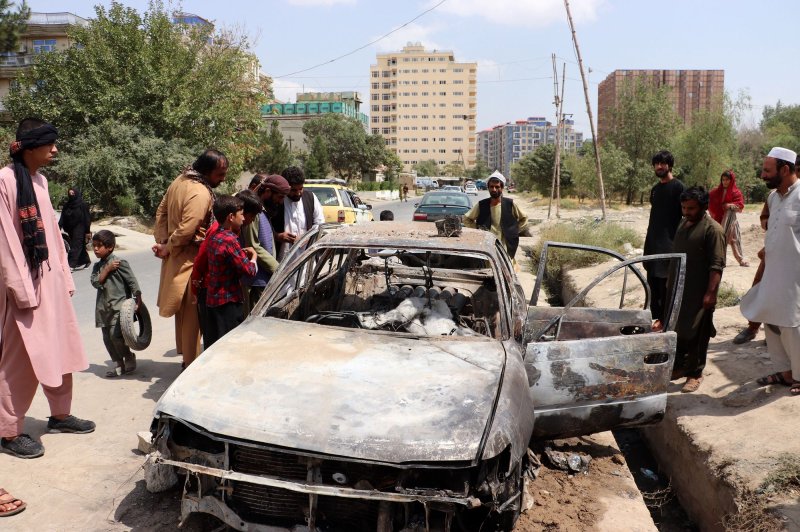Afghans inspect a damaged vehicle after it was used to fire rockets toward the international airport in Kabul, Afghanistan, in 2021. A report by Brown University's Cost of War Project published on Tuesday has found that more than 4.5 million people have been killed as a result of wars since 9/11. File Photo by Bashir Darwish/UPI |
License Photo
May 16 (UPI) -- More than 4.5 million people have died from wars since the Sept. 11 terrorist attacks, according to a new study from the Costs of War project at Brown University's Watson Institute.
The report estimated that between 906,000 to 937,000 people have been killed as a direct result of wars in Afghanistan, Iraq, Pakistan, Syria, Yemen, Libya, and Somalia. Furthermore, as many as 3.6 million people have died indirectly from war-related problems such as economic collapse, food insecurity, destruction of public health facilities, environmental contamination, and recurring violence.
The report specifically cited the U.S. role in these foreign conflicts after the 2001 terror attacks on U.S. soil.
"These countries have experienced the most violent wars in which the U.S. government has been involved in the name of counterterrorism since 2001," the Cost of War project said. "The report points out that the true impacts are so vast and complex that they are unquantifiable and, thus, does not generate a precise mortality figure, but instead provides a reasonable and conservative estimate."
Stephanie Savell, the Costs of War co-director and author of the report, said the United States has a responsibility to repair the damage done by its war efforts.
"The United States government, while not solely responsible for the damage, has a significant obligation to invest in humanitarian assistance and reconstruction in post-9/11 war zones," Savell said in a statement. "The U.S. government could do far more than it currently is to act on this responsibility."
In March, the Senate voted to repeal legislation passed 20 years ago that authorized the use of American military forces in Iraq.
The bipartisan bill was co-authored by Sen. Todd Young, R-Ind., and Sen. Tim Kaine, D-Va.
"Finally, the Senate voted to formally end the decades-long Gulf and Iraq Wars. Proud to lead the bill to get this done," Kaine said in a statement following the vote.
"The mission is over, and the war authorizations against Iraq are now outdated and unnecessary," Kaine said. "It's time to repeal them."















